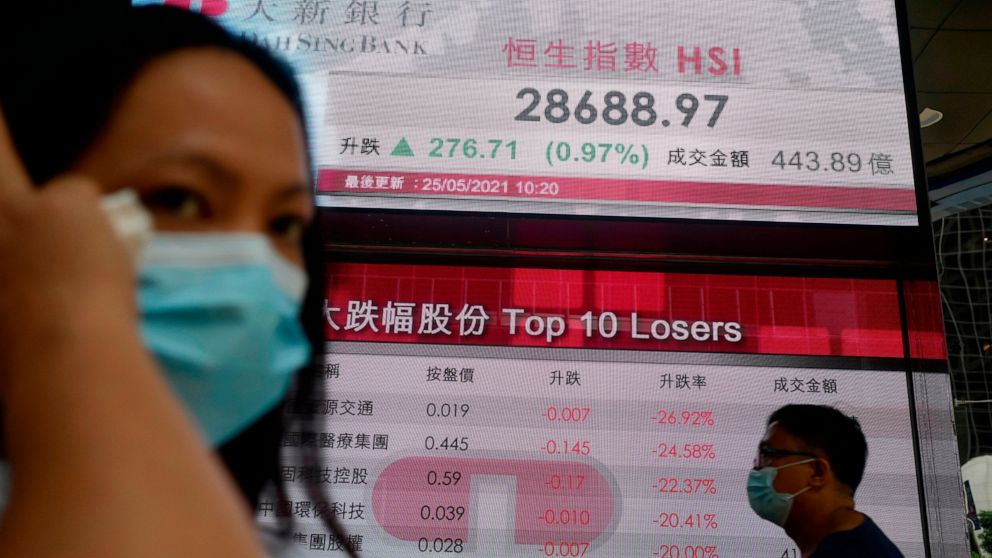Stocks give up an early gain and end lower on Wall Street
Stocks closed lower on Wall Street, giving up an early gain and losing momentum after a solid start to the week
BEIJING — Stocks closed lower on Wall Street, giving up an early gain and losing momentum after a solid start to the week. The S&P 500 slipped 0.2% Tuesday. Gains by several Big Tech companies helped limit the loss in the Nasdaq to less than 0.1%. An index of small-company stocks fell 1%. Banks and energy companies fell the most. Investors are still worried that rising inflation could eventually prompt central banks to withdraw help for the economy. Homebuilders rose following a report that U.S. home prices jumped in March by the most in more than seven years.
THIS IS A BREAKING NEWS UPDATE. AP’s earlier story follows below.
Stocks were wavering between small gains and losses Tuesday as investors weighed the economic recovery’s progress against lingering concerns about inflation.
The S&P 500 was down 0.1% as of 2:19 p.m. Eastern. The Dow Jones Industrial Average was down 35 points, or 0.1%, to 34,356 and the Nasdaq was down less than 0.1%.
Homebuilders were among the biggest gainers following a report that U.S. home prices jumped in March by the most in more than seven years as an increasing number of would-be buyers compete for a dwindling supply of houses. D.R. Horton rose 2.9% and Toll Brothers gained 2.3%. KB Home rose 4.2% after also reporting that orders have so far more than doubled during the second quarter.
The red-hot housing market and a report that consumer confidence remains strong gave investors another signal that the economic recovery continues. Businesses have been reopening as more people get vaccinated and new COVID-19 cases fall. Moderna rose 2.8% after the drugmaker said its COVID-19 vaccine was found to be effective in children aged 12 to 15.
Inflation remains a concern, particularly if the global economic recovery is hampered if governments and central banks have to withdraw stimulus to combat rising prices. It’s partly why stocks fell the previous two weeks. Still, analysts expect any rise in inflation to be tied to the growing economy and will likely be more moderate.
“Of course they’re still elevated, but fears of inflation seem to have come off the boil a little bit here,” said Katie Nixon, chief investment officer at Northern Trust Wealth Management.
Bond yields have been relatively stable after rising sharply earlier in the year. The yield on the 10-year Treasury fell to 1.57% from 1.60% late Monday.
“We could see some upward pressure on rates, but ultimately Treasuries will be range-bound for the foreseeable future,” Nixon said.
Investors will get more clues about the economic recovery’s trajectory this week. The Commerce Department will release its GDP report for the first quarter on Thursday. The U.S. economy grew at an annual rate of 4.3% in the final three months of 2020, which was slightly faster than previously estimated. Economists expect a huge rebound this year.
The Labor Department will release its weekly unemployment report on Thursday. Employment has been a closely watched factor for the economy. It has lagged other measures throughout the recovery so far and is viewed as necessary for a sustained rebound.
![]()


